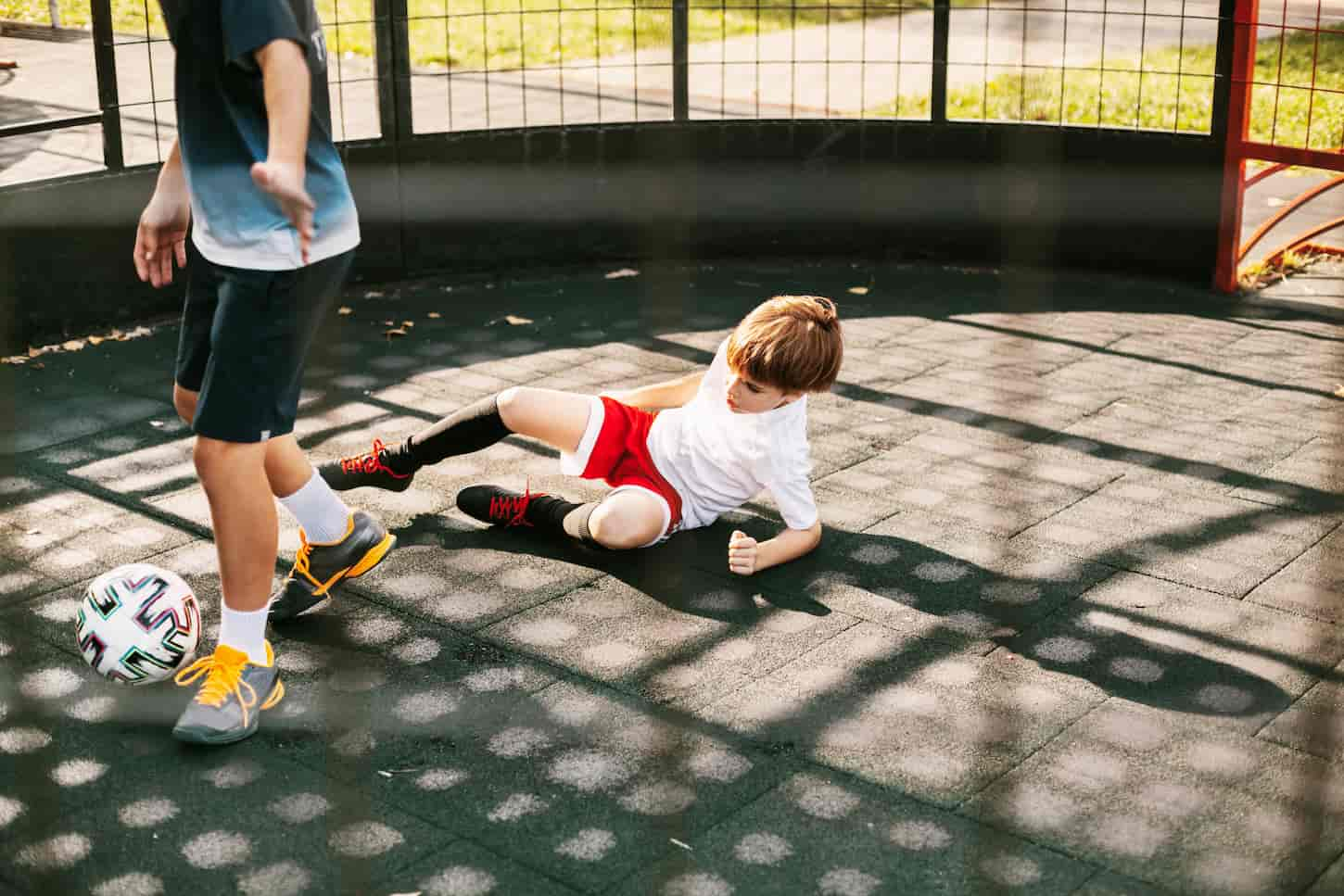Kickball is a fun game that was invented in the 20th century as an easy way to teach kids how to play baseball. Mixing the rules and skills of soccer, softball, and baseball, it’s a great game for the whole family to play, as it’s accessible and fun for everyone!
Kickball is pretty similar to playing baseball, with the key difference that the game is played with an 8-16” rubber ball which is pitched at and then kicked by the offensive team. Kickball was invented as a simple introduction to baseball.
If you think that sounds interesting, read on to find out more about the rules of kickball, and some Kickball FAQs!

Kickball Rules
If you’re familiar with the rules of baseball, you’ll pick up kickball in no time at all. For beginners, there’s a little more to learn! Although there are many nuances to the rules of kickball, here are some of the main ones that’ll give you what you need to know to get started.
Pitching the Ball
- The ball is pitched at the kicker in any manner the pitcher likes. The pitcher must have at least one foot on the pitching base to do this legally.
- If the ball enters the kicking zone (at the kicking base, below the hip height of the kicking player) and the kicking player doesn’t touch it, this is a strike. Three strikes is an out, which removes the kicker from play for the innings.
- If the ball doesn’t enter the kicking zone, then it is known (confusingly!) as a ball. A count of four balls means that the kicker can move to first base without kicking the ball. If this happens with no strikes, they can move to second base.
Pitching the ball is often done via rolling it underhanded. This is especially true if there are a lot of children playing the game, as it’s easier to kick a rolling ball than one that’s mid-air or bouncing a lot.
Kicking the Ball
- When the ball is pitched, the kicker has a chance to kick the ball. Any contact of the ball with the leg below the hip is considered a kick.
- All kicks must happen within the kicking box (although kickers can begin outside of the box)
- To be considered a ‘fair ball’ (so valid for the kicker to run), it must be kicked within the diagonal fair zone lines of the field. There are quite a lot of nuances to this, so in some circumstances, you may need to consult more comprehensive rules, but this is the key idea!
If you’re familiar with baseball, think about what it means to hit a fair ball. It has to be between the first and third baselines to be considered a “fair” ball – and for it to be in play.
Running
- Runners can only run once the ball is kicked
- Runners must run within the baseline
- Runners must not overtake other runners or they will be ruled out
- Runners are safe while in contact with a base
Some runners may choose to lead off the base – or stand a few feet away from a base while the pitcher is getting ready to throw the ball to the kicker. That way, they’ll have a few feet’s heads start when the kicker makes contact with the ball so they can get to the next base faster.
However, leading off of a base is a more advanced technique. So if you’ve got a lot of kids, just have players stand on the base until it’s time to run.

How to Start a Game
Before you get started, you’ll need to get the right equipment. You don’t need lots of things to get set up, but you’ll need a softball pitch (or similar-sized setup), with bases 60’ apart and a pitching space in the middle. You’ll also need a kickball (which is 8-16” in diameter), and two teams of between 5 and 11 players.
Once you’ve got all the necessary stuff set up, play can begin! The two teams alternate between the pitching team and the kicking team, playing until each kicker is out.
Each set of turns (with both teams having an opportunity to kick) is known as an inning.
How to Score Points
To score a point in kickball, a player needs to successfully make it around all the bases, returning to the ‘home’ base without being gotten or tagged out. This can happen by the ball reaching the base that the player is running to before them, or being touched by the ball while not in the safety of a base.
How Long Do Kickball Games Last?
The length of kickball games varies by kickball league but is decided by time or the number of innings, normally seven. When organized by time, the ‘home’ team will be given the same amount of running opportunities as the kicking team.
Some games may be shorter as, if at the end of any innings a team is behind by twelve or more points, the team captain can choose to forfeit the game. Generally, games will last somewhere in the realm of 45 minutes to an hour.
If you’re short on time, do something easy, like 10-minute innings. Each team gets five minutes to kick and the other five minutes to play defense.
Kickball Common Scenarios and FAQs
Rules are one thing, but it’s also important to understand what they mean in certain common scenarios. Here are some common questions that kickball players have about how to play the game.
What happens if the kickball you kicked is caught in mid-air?
If you kick the kickball and it is caught in mid-air before touching the floor, then unfortunately you are out and cannot continue to kick in this inning unless your turn comes up again.
The caught ball may touch the floor as part of the catch, but as long as the catching player is always in control then you are still out.
What do you do if a kickball hits you?
If you’re hit by the kickball while at a base, you’re safe and nothing happens. However, if you’re hit by the ball while between bases, you will be ruled out.
The exception to the rule is if you are hit by the ball in the head or neck (unless diving) – this is a foul by the pitching team. As such, your team will be awarded an extra point.
In the case that a team believes you’ve deliberately tried to get hit in the head by the ball, the referee will rule. Fair play is one of the key aspects of kickball, so playing in this way is extremely looked down on.
Seriously. Don’t cheat. Kickball is supposed to be fun. Don’t actively try to get hit in the head.
What happens if I catch the kickball after it was kicked?
If you catch the kickball mid-air, then you’ve gotten the kicking player out. You can still continue to try to get other players out by throwing it at them between bases, or by throwing it to players on your team standing at the bases.
If there’s no further opportunity to get someone out, just return the ball to the pitcher so that play can resume.
How do you get someone out in kickball?
There are a few ways to get someone out of kickball. These include any of the following.
- Catching the ball mid-air after being kicked, and before it touches the ground.
- Hitting a player with the ball between bases – as long you don’t hit the runner in the head or neck.
- Hitting the base that a player is running to with the ball.
- Holding the ball and tagging a base a player is running to with your foot.
- Players can also get themselves out by committing fouls. Fouls can include:
- Running past another player
- Playing aggressively, or kicking in the wrong order (a different order to that specified by the coach’s kicking list)
Are you allowed to steal in kickball?
You can’t steal bases in kickball as you can in baseball. A running player may only move after the ball has been kicked.
Some leagues allow players to lead off the base, but that’s not proper stealing of a base. That’s just getting to the next base faster. Just keep in mind that leading off does carry a greater risk of getting tagged out in some cases.
What if you don’t have an 8-16″ rubber kickball?
If you don’t have a rubber kickball, you can use a soccer ball to play kickball for most backyard games. Leagues may not allow soccer balls, though.
If you do use a soccer ball, consider changing the rule so that you can’t peg anyone under the age of 10 or so with the ball at all to get them out. Otherwise, it’ll sting when it hits them.
Another option is to get a large, cheap ball from your local grocery store or big box store. Whenever we need a new ball, the local grocery store almost always has options for as little as $2-$5, depending on the size of the ball.
Final Thoughts on Kickball Rules
Kickball doesn’t have to be fancy – or hard. It can be as easy as throwing down four shirts in a square-ish shape that fits into your backyard – actual dimensions totally ignored.
Or it can be in a local league, with rules, regulations, and team uniforms.
Kickball can also be as laid-back fun or intense as you want it to be. So get out there, play some kickball, and have a ton of fun.
Resources
Learning from your own experiences is important, but learning from others is also smart. These are the sources used in this article and our research to be more informed as a family of sports nuts wannabes.
- “Rules – World Kickball Association.” World Kickball Association, 1 July 2020, kickball.com/rules/.
- “Rules of the Kickball Society.” Rules, www.kickballsociety.com/index.php?option=com_content&view=article&id=3&Itemid=16#:~:text=If%20the%20ball%20is%20kicked,a%20foul%20can%20be%20called.
